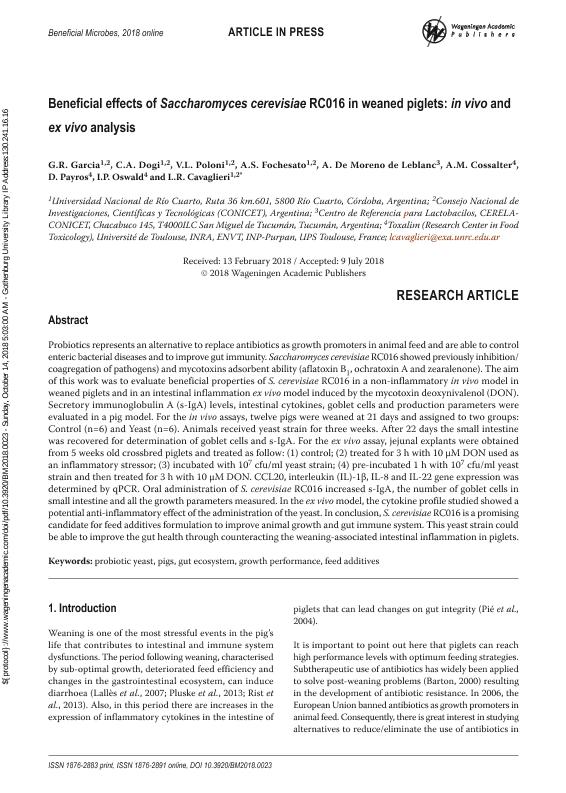Artículo
Beneficial effects of saccharomyces cerevisiae RC016 in weaned piglets: In vivo and ex vivo analysis
García, Gisela Romina ; Dogi, Cecilia Ana
; Dogi, Cecilia Ana ; Poloni, Valeria Lorena
; Poloni, Valeria Lorena ; Fochesato, Analía Silvia
; Fochesato, Analía Silvia ; de Moreno, Maria Alejandra
; de Moreno, Maria Alejandra ; Cossalter, Anne Marie; Payros, Delphine; Oswald, Isabelle P.; Cavaglieri, Lilia Reneé
; Cossalter, Anne Marie; Payros, Delphine; Oswald, Isabelle P.; Cavaglieri, Lilia Reneé
 ; Dogi, Cecilia Ana
; Dogi, Cecilia Ana ; Poloni, Valeria Lorena
; Poloni, Valeria Lorena ; Fochesato, Analía Silvia
; Fochesato, Analía Silvia ; de Moreno, Maria Alejandra
; de Moreno, Maria Alejandra ; Cossalter, Anne Marie; Payros, Delphine; Oswald, Isabelle P.; Cavaglieri, Lilia Reneé
; Cossalter, Anne Marie; Payros, Delphine; Oswald, Isabelle P.; Cavaglieri, Lilia Reneé
Fecha de publicación:
10/2018
Editorial:
Wageningen Academic
Revista:
Beneficial Microbes
ISSN:
1876-2883
e-ISSN:
1876-2891
Idioma:
Inglés
Tipo de recurso:
Artículo publicado
Clasificación temática:
Resumen
Probiotics represents an alternative to replace antibiotics as growth promoters in animal feed and are able to control enteric bacterial diseases and to improve gut immunity. Saccharomyces cerevisiae RC016 showed previously inhibition/ coagregation of pathogens) and mycotoxins adsorbent ability (aflatoxin B1, ochratoxin A and zearalenone). The aim of this work was to evaluate beneficial properties of S. cerevisiae RC016 in a non-inflammatory in vivo model in weaned piglets and in an intestinal inflammation ex vivo model induced by the mycotoxin deoxynivalenol (DON). Secretory immunoglobulin A (s-IgA) levels, intestinal cytokines, goblet cells and production parameters were evaluated in a pig model. For the in vivo assays, twelve pigs were weaned at 21 days and assigned to two groups: Control (n=6) and Yeast (n=6). Animals received yeast strain for three weeks. After 22 days the small intestine was recovered for determination of goblet cells and s-IgA. For the ex vivo assay, jejunal explants were obtained from 5 weeks old crossbred piglets and treated as follow: (1) control; (2) treated for 3 h with 10 μM DON used as an inflammatory stressor; (3) incubated with 107 cfu/ml yeast strain; (4) pre-incubated 1 h with 107 cfu/ml yeast strain and then treated for 3 h with 10 μM DON. CCL20, interleukin (IL)-1β, IL-8 and IL-22 gene expression was determined by qPCR. Oral administration of S. cerevisiae RC016 increased s-IgA, the number of goblet cells in small intestine and all the growth parameters measured. In the ex vivo model, the cytokine profile studied showed a potential anti-inflammatory effect of the administration of the yeast. In conclusion, S. cerevisiae RC016 is a promising candidate for feed additives formulation to improve animal growth and gut immune system. This yeast strain could be able to improve the gut health through counteracting the weaning-associated intestinal inflammation in piglets.
Palabras clave:
FEED ADDITIVES
,
GROWTH PERFORMANCE
,
GUT ECOSYSTEM
,
PIGS
,
PROBIOTIC YEAST
Archivos asociados
Licencia
Identificadores
Colecciones
Articulos(CCT - CORDOBA)
Articulos de CTRO.CIENTIFICO TECNOL.CONICET - CORDOBA
Articulos de CTRO.CIENTIFICO TECNOL.CONICET - CORDOBA
Articulos(CERELA)
Articulos de CENTRO DE REFERENCIA PARA LACTOBACILOS (I)
Articulos de CENTRO DE REFERENCIA PARA LACTOBACILOS (I)
Citación
García, Gisela Romina; Dogi, Cecilia Ana; Poloni, Valeria Lorena; Fochesato, Analía Silvia; de Moreno, Maria Alejandra; et al.; Beneficial effects of saccharomyces cerevisiae RC016 in weaned piglets: In vivo and ex vivo analysis; Wageningen Academic; Beneficial Microbes; 10; 1; 10-2018; 33-42
Compartir
Altmétricas



